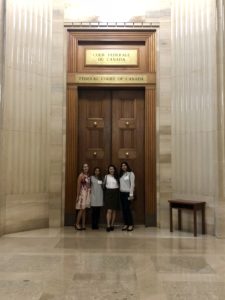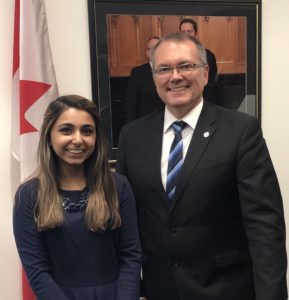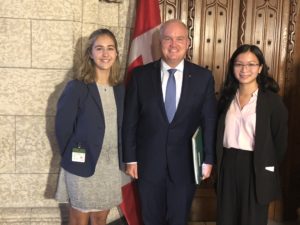For the third consecutive year, Munk One has participated in U of T’s annual Women in House program at Parliament Hill. Taking place during October 15 and 16 this year, the program allowed students to shadow politicians for a day in hopes of promoting greater female representation in the government. Created by Dr. Tina Park and the Honourable Dr. Carolyn Bennett, the program is a non-partisan and bilingual program that has grown over the past few years. As always, our Munk One students are engaging actively and have shared their rewarding experiences.
—–
Fayha Najeeb:
Through the Women in House program, I was fortunate enough to shadow MP Luc Berthold of Mégantic-L’Érable for a day on Parliament Hill. This experience further sparked my interest in challenging the ideas that we hold onto today, channeling my ambition into positive roles, and continuing to learn and study the policies and laws around me.
Upon arrival, we had the opportunity to attend a Q & A period with the well accomplished, charismatic and humble Justice Rosalie Abella. She provided us with small, yet significant anecdotes from her life that incited the passion she has today for equality and justice. The piece of advice she gave that stuck with me was that the best way to learn more about your own views and to be able to defend them, is by exposing yourself to views that differ from your own. The same idea is prevalent in our Munk One classes when we discuss controversial ideas on global policy and research. The opportunity we have to openly discuss different points of views on these ideas is what I value and enjoy about sitting in a class with 25 other students that all come have different interests and backgrounds, but contribute to the same discussion.
My morning shadowing the highly experienced and passionate Mr. Berthold began with a breakfast in the Parliamentary Restaurant with him and his assistant, Mr. Berthiaume. We discussed how the role of women in politics has changed, and the importance of the structure of leadership in decision making. I was very fortunate to have shadowed Mr. Berthold because throughout the conversation, I found myself questioning a lot of the ideas that I had previously learned and adapted myself to. The fact that Mr. Berthold and I had differing opinions on certain subjects led to constructive discussions and reaffirmed Justice Abel’s advice to expose yourself to views that differ from your own.
Later, we attended a committee meeting on the agriculture and agri-food sector, focusing on the mental health of agricultural workers. In this committee, the MPs had invited witnesses to give their personal statements and recommend solutions. I later asked Mr. Berthold what they do with the information they collect from the witnesses. I was told that with the information and discussions amongst MPs, they compile a report consisting of the solutions recommended by the witnesses and various MPs. It was refreshing to see that the same notion we often debate in Munk One of taking the ideas and recommendations of those being impacted first hand, is being implemented and tested at the federal level.
In addition to shadowing, I was constantly surrounded by strong and intelligent female leaders and equally as intelligent and supportive men throughout the trip. These women had challenged barriers and created a platform for themselves at the highest level of government. I am so thankful for the opportunity I had to meet with these experienced and intelligent leaders, and to have come back with a refreshed sense of empowerment and perseverance to work hard and create meaningful change.
Glenne LeBaron:
Nevertheless she persisted. An elegant statement made to degrade my state senator. I like to think my generation harnessed an attempt to silence and turned it into a war cry. As Elizabeth Warren stood at the podium criticizing the nomination for Attorney General, Mitch McConnell invoked a rarely used clause to end her speech. To him the logic was obvious “She was warned; she was given an explanation; nevertheless, she persisted.” This all too easy logic is one that has allowed those in the majority ensure their power remains intact. Mitch McConnell did not mean to strike a chord with the oppressed, but any women, person of colour, or queer citizen can immediately recognize the sentiment; that those who do not fit, must remain silent.
Despite such systemic faults, I believe in the purpose of the institutions we have designed to govern ourselves. As a Munk One student, I see the world divided into issues and stakeholders. I see how many of our pressing modern issues, such as climate change and cyclical poverty as products of the society we live in. As an American, I worry that we have created a political beast that almost negates the ‘nevertheless she persisted attitude,’ instead choosing the status quo and the past over the future. New to Canada, I am hopeful to discover a more civil, fact-based governmental body. I was enticed by the prospect of viewing our policy makers in action through the Women in House program,
In our private Q & A with the Honourable Justice Abella, she stated that a system that is not working for the people is not working. She meant this in the sense that our legal system prioritizes a system that benefits lawyers and judges. To some extent my passion — environmental protection — is not working for the people. It has a clear goal, known moral justification and obvious stakeholders. Just like Justice Abella, my reasons to desire change and provide equality have not shifted. However, I feel as though my day on the Hill demonstrates that if, in some cases, the fact that action must be taken is not enough to cross party lines, then there must be flaws in the system. I’ve spent my life trusting the due process of whichever government I lived under, but now I worry, much like my host, MP Erin O’Toole, if the polarization of issues means that our system is working for votes rather than for the people. This is not a resignation of our nation’s flaws, but an opportunity to make the system work for all people, including those in the future. There is a need to bring politics away from image and back to the experts, the stakeholders, and the outcomes. The weighting of these matters creates enough difference in the how of government without party lines further removing us from our democratic goal.
As a debater, I hold two concepts highly: weighting and rebuttal. Honestly, the Q & A period hurt the debater inside me. As the Conservatives and NDP interrogated the Liberal Party, responses were stiff, prepared and clear dodges to the questions asked. We value transparency and discourse, but that was neither discourse nor transparent.
As a Munk One student, I see each MP looking out for the needs of their current riding. I grapple with this due loyalty to their constituents, but also an obligation for the betterment of Canada as a whole, and in the future. Especially with issues such as climate change that demonstrate a future benefit but current cost, I understand (but do not agree) with the stagnation to create effective climate policy.
If our system is not working for all Canadians, current and future, there must either be something wrong with the system or something wrong with who governs the system. This is why I must continue to believe in the judicial values presented by Justice Abella, and maintain my ‘nevertheless she persisted’ attitude. Our world is full of issues and view points, and only by leaving fear and loyalty to party lines over loyalty to the truth at the door can we continue to persist for the type of policy and action we need.
Maria Lin:
Sometimes we lose hope in the leaders of today’s society when facing issues such as racism, white supremacy, and indigenous rights. However, I saw the light of justice and equality in the moments I shared with both Justice Abella and MP Vance Badawey.
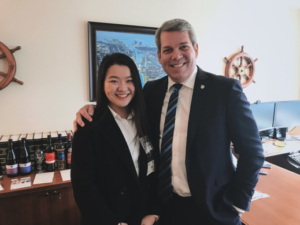
Maria shares a photo with
Liberal MP Vance Badawey of Niagara Center after a discussion on youth engagement.
Upon arriving in Ottawa, I had the opportunity to listen to stories and powerful insights from the Honourable Justice Abella. The hour I spent with her was beyond motivational, and no words can describe this unforgettable experience. Justice Abella did not think twice about becoming a lawyer, and she marched on with controversies and disapproval, becoming the first Jewish female judge at the age of 29. In the eyes of the Honourable, nothing intimidated her as she faced many types of discrimination. Feminism in her words is not about treating females the same, but eliminating barriers. Coming out of that courtroom, I felt empowered by a hero who trusted in her abilities and worked relentlessly to showcase the world that impossible does not exist in her dictionary. Among all of Justice Abella’s words of wisdom, one quote strongly resonated with me: ” I worked harder than anyone I knew, but I never felt it was hard because I loved all of it.”
I also had the incredible honour to experience what a day on the Hill is like by shadowing Liberal MP Vance Badawey who represents the Niagara Center. I was able to sit in with MP Vance on the Standing Committee on Transport, Infrastructure and Communities, as well as the Standing Committee on international trade to watch real-time policy discussions among the MPs and witnesses. Even though MP Vance had a packed schedule running in between committee meetings, he still took time to chat with me. During our conversation, I’ve gained respect for this individual who believes in working close to the ground and for the people. In Vance’s perspective, what matters to him the most during his time on the Hill is filling up his “toolbox.” He wishes to bring the most helpful insights back to his riding and serve the people better. It was pleasing to know how much MP Vance believes in and stands by youth engagement as he created a youth council when he was the mayor. He emphasized the importance of making our ideas and opinions known and not to underestimate the power we have to shape the political system. In between MP Vance’s busy schedule, I had the opportunity to visit MP Joyce Murray’s office as a former member of her Vancouver Quadra Youth Council.
Growing up, I was told that politics is too sensitive of a matter to be discussed. With that in mind, I watched generations keep their mouths sealed and take the uncomfortable matters as a part of life. Human rights are not known to people, and when the violation occurs, they are often ignored. Listening to the conversations going on in the courtrooms and meeting rooms, I realized that only discussions have the power to positively impact our political and legal systems. Such talks can engage with a broader audience in the policy-making process that shapes the law to serve justice to people in our country. It also made me recognize how fortunate I am to be a part of the Munk One progam, which allows me to engage in meaningful discussions, conduct research about humanitarian issues, and assess interventions as a first-year student. We have just as much power as the justices of the Supreme Court of Canada and the politicians in committee meetings, and let us use that power in the most meaningful and effective way.
Nika Asgari:
There is no better form of empowerment than when women you look up to tell you the one thing they would like to see most in this world is the success of you and your fellow female peers. And that is what this trip was: empowering. From the moment we walked into our first parliamentary institution, we had a sense that everyone we were surrounded by wanted us to reach our full potential.
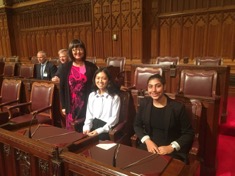
Nika (far right) sits in the House of Commons with fellow UofT student Jennifer Han, as Senator Yonah Martin stands beside them.
This is the same feeling I get every time I walk into a Munk One class, although we learn about some of the world’s greatest devastations, we are also reminded of the power of activism and our voices as youth.
On the trip, I was able to join another Women in House participant and shadow Senator Yonah Martin. Senator Martin provided us with insight into the struggles she had to endure in order to be respected as a woman of colour, but urged us to pursue our passions in life and not be phased by obstacles.
This trip and the Munk Program make me actively recognize how tremendously important representation is. As women, we rarely see examples of the accomplishments we have achieved within our society; as women of colour we see this representation even less. But when we are adequately represented in governments and stakeholders around the world, all lives positively change.
—–
Thank you to all of our students for providing their wonderful insights. Looking forward to U of T Women in House 2019!
